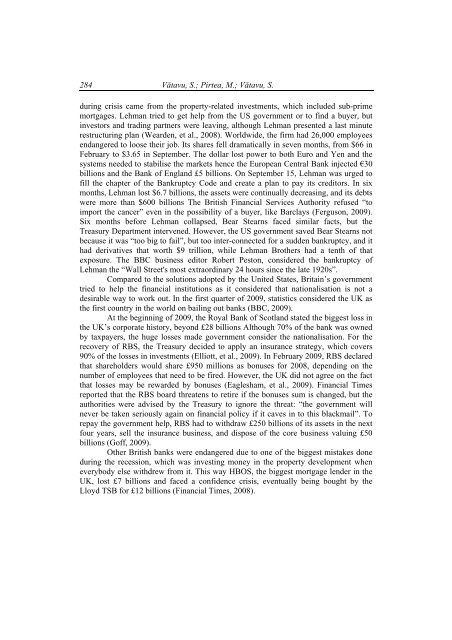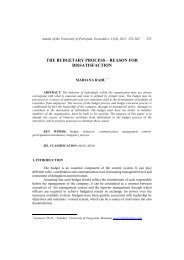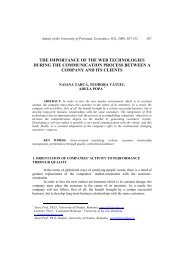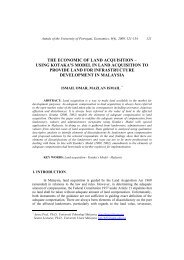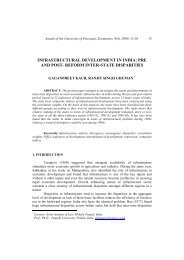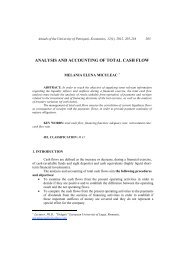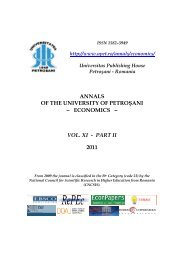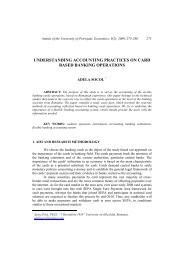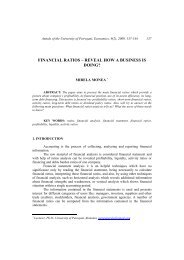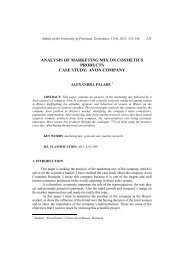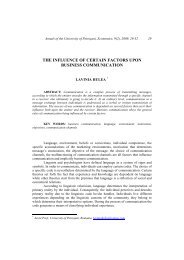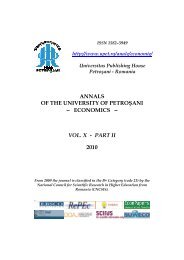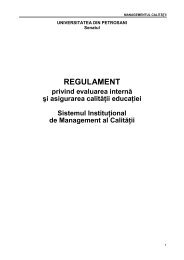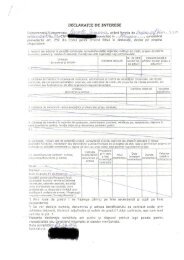annals of the university of petroÅani â¼ economics â¼ vol. xi - part i ...
annals of the university of petroÅani â¼ economics â¼ vol. xi - part i ...
annals of the university of petroÅani â¼ economics â¼ vol. xi - part i ...
You also want an ePaper? Increase the reach of your titles
YUMPU automatically turns print PDFs into web optimized ePapers that Google loves.
284 Vătavu, S.; Pirtea, M.; Vătavu, S.<br />
during crisis came from <strong>the</strong> property-related investments, which included sub-prime<br />
mortgages. Lehman tried to get help from <strong>the</strong> US government or to find a buyer, but<br />
investors and trading <strong>part</strong>ners were leaving, although Lehman presented a last minute<br />
restructuring plan (Wearden, et al., 2008). Worldwide, <strong>the</strong> firm had 26,000 employees<br />
endangered to loose <strong>the</strong>ir job. Its shares fell dramatically in seven months, from $66 in<br />
February to $3.65 in September. The dollar lost power to both Euro and Yen and <strong>the</strong><br />
systems needed to stabilise <strong>the</strong> markets hence <strong>the</strong> European Central Bank injected €30<br />
billions and <strong>the</strong> Bank <strong>of</strong> England £5 billions. On September 15, Lehman was urged to<br />
fill <strong>the</strong> chapter <strong>of</strong> <strong>the</strong> Bankruptcy Code and create a plan to pay its creditors. In six<br />
months, Lehman lost $6.7 billions, <strong>the</strong> assets were continually decreasing, and its debts<br />
were more than $600 billions The British Financial Services Authority refused “to<br />
import <strong>the</strong> cancer” even in <strong>the</strong> possibility <strong>of</strong> a buyer, like Barclays (Ferguson, 2009).<br />
Six months before Lehman collapsed, Bear Stearns faced similar facts, but <strong>the</strong><br />
Treasury De<strong>part</strong>ment intervened. However, <strong>the</strong> US government saved Bear Stearns not<br />
because it was “too big to fail”, but too inter-connected for a sudden bankruptcy, and it<br />
had derivatives that worth $9 trillion, while Lehman Bro<strong>the</strong>rs had a tenth <strong>of</strong> that<br />
exposure. The BBC business editor Robert Peston, considered <strong>the</strong> bankruptcy <strong>of</strong><br />
Lehman <strong>the</strong> “Wall Street's most extraordinary 24 hours since <strong>the</strong> late 1920s”.<br />
Compared to <strong>the</strong> solutions adopted by <strong>the</strong> United States, Britain’s government<br />
tried to help <strong>the</strong> financial institutions as it considered that nationalisation is not a<br />
desirable way to work out. In <strong>the</strong> first quarter <strong>of</strong> 2009, statistics considered <strong>the</strong> UK as<br />
<strong>the</strong> first country in <strong>the</strong> world on bailing out banks (BBC, 2009).<br />
At <strong>the</strong> beginning <strong>of</strong> 2009, <strong>the</strong> Royal Bank <strong>of</strong> Scotland stated <strong>the</strong> biggest loss in<br />
<strong>the</strong> UK’s corporate history, beyond £28 billions Although 70% <strong>of</strong> <strong>the</strong> bank was owned<br />
by taxpayers, <strong>the</strong> huge losses made government consider <strong>the</strong> nationalisation. For <strong>the</strong><br />
recovery <strong>of</strong> RBS, <strong>the</strong> Treasury decided to apply an insurance strategy, which covers<br />
90% <strong>of</strong> <strong>the</strong> losses in investments (Elliott, et al., 2009). In February 2009, RBS declared<br />
that shareholders would share £950 millions as bonuses for 2008, depending on <strong>the</strong><br />
number <strong>of</strong> employees that need to be fired. However, <strong>the</strong> UK did not agree on <strong>the</strong> fact<br />
that losses may be rewarded by bonuses (Eaglesham, et al., 2009). Financial Times<br />
reported that <strong>the</strong> RBS board threatens to retire if <strong>the</strong> bonuses sum is changed, but <strong>the</strong><br />
authorities were advised by <strong>the</strong> Treasury to ignore <strong>the</strong> threat: “<strong>the</strong> government will<br />
never be taken seriously again on financial policy if it caves in to this blackmail”. To<br />
repay <strong>the</strong> government help, RBS had to withdraw £250 billions <strong>of</strong> its assets in <strong>the</strong> next<br />
four years, sell <strong>the</strong> insurance business, and dispose <strong>of</strong> <strong>the</strong> core business valuing £50<br />
billions (G<strong>of</strong>f, 2009).<br />
O<strong>the</strong>r British banks were endangered due to one <strong>of</strong> <strong>the</strong> biggest mistakes done<br />
during <strong>the</strong> recession, which was investing money in <strong>the</strong> property development when<br />
everybody else withdrew from it. This way HBOS, <strong>the</strong> biggest mortgage lender in <strong>the</strong><br />
UK, lost £7 billions and faced a confidence crisis, eventually being bought by <strong>the</strong><br />
Lloyd TSB for £12 billions (Financial Times, 2008).


